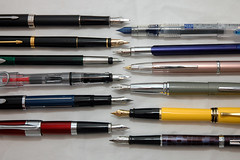 Once I left graduate school, I went to work in industry which influenced how I write. Writing for me is not an academic exercise. Rather I write to make point, to influence, or to inform. My writing tends to be straightforward and not what I consider "academic."
Once I left graduate school, I went to work in industry which influenced how I write. Writing for me is not an academic exercise. Rather I write to make point, to influence, or to inform. My writing tends to be straightforward and not what I consider "academic."When I read student papers, I first look for students to write a a graduate level. Now...this is a "know it when I see it" difference between undergraduate and graduate writing. Undergraduate writing may not be as probing or analytical. (Yes, I know that is a broad assumption and it doesn't fit every undergraduate author.) When I give feedback on writing that I want to be more graduate-level work, then the question becomes how to convey that difference to someone.
So what is graduate-level writing? As I've talked to colleagues and former students, these points are mentioned:
- In a professional program (which library science is), the student is writing for his professional peers, which includes fellow students, faculty and members of the profession. This is different in tone and structure, I think, than undergraduate writing. It may be academic in style or may be more business like, depending on the assignment.
- Some consider that graduate students should strive to write in language similar to that of their professors. The student should try to strive - through his writing - to be a intellectual peer of the professor. If this uncomfortable for the student, then the student needs to strive to get comfortable with it.
- Graduate-level writing is not regurgitating information. Instead there needs to be synthesis.
- Graduate students are expected to immerse themselves in the topic. That immersion should be evident when someone reads the paper. That immersion does not necessary translate into a longer paper, but in how the topic is discussed.
- Graduate-level writing should include both the big picture and details. It is up to the student to understand how to balance both in the context of the paper.
- The paper should stand on its own. It does not leave people wondering because it contains holes.
- For me, professional-level writing is more succinct and more to-the-point.
- It might not have much theory in it, but rather focus on what is happening in the field.
- Structurally, professional works are laid out so that the executive can quickly locate specific sections to read. Subheadings and lists (bullet points) are using to organize the information.
- The material is actionable. In order words, it is clear how the information might be applied.
So how do I move a student from undergraduate-level writing to graduate-level writing, and then onto professional-level writing? With feedback, conversations, arm waving, and assignment descriptions. Or...in others, not in one step, but through what is likely a series of small steps. I have to get the student to know it when he/she sees it, and that is not easy. It can help if the students have a chance to view each other's work, but that needs to happen in a way that is comfortable for everyone. During that "view", I can ask students to notice formatting, synthesis, etc.
It can also happen through assigned readings, if students see those readings as representative targets for which they should strive.
I also think that you - internship site supervisors and people who see student work (perhaps it is a project they are doing for you) can also provide feedback. Tell the student what you're expectations are in terms of style and content, or how what they did would be different if done in a professional (non-academic) setting. Show them examples of work that you feel epitomizes what you are looking for. You might even recommend publications or writers that they can follow in order to be constantly exposed to the writing style for they should strive.
If you and I can help students improve their writing - even slowly - it will be helpful to them. We know that employers evaluate an applicants writing style in a number of ways, and so those students need to be able to shine when that happens.
--
Nov. 20, 2015: I've had conversations with people who appreciate that I wrote this post, but who also disagree with me on some of it. If you have a different point of view, PLEASE leave a comment! I think it would be helpful if employers and other faculty commented, especially if your opinion differs.
1 comment:
Nice writing, Jill; very much enjoyed reading it. Hope it inspires your readers of all ages to explore what their own voices, at the highest possible levels of writing, are capable of inspiring.
Post a Comment